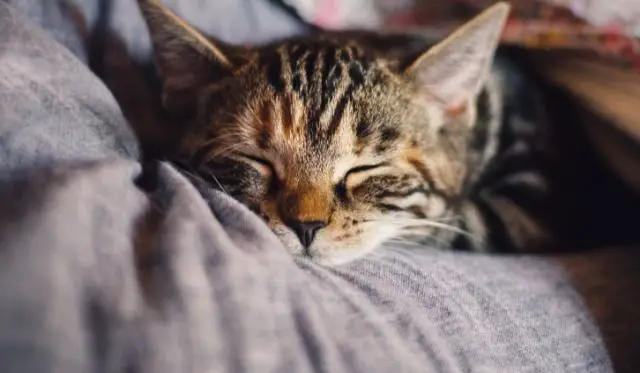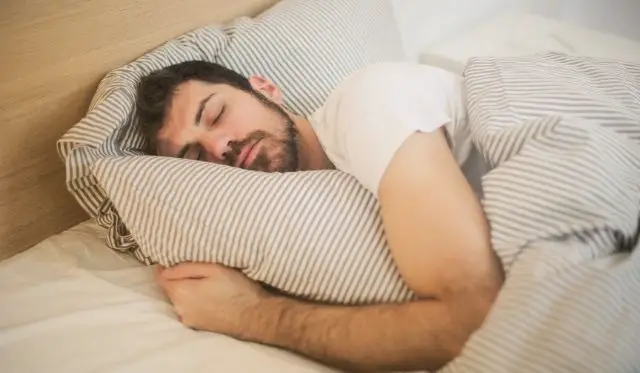We spend so much of our lives asleep but spend so little thinking about it. How much do you know about sleep? Are you aware of your sleep patterns and how they influence your day-to-day life?
Are you somebody that falls asleep quickly and has a restful sleep and wonderful dreams? Or, on the other hand, are you perhaps somebody that delays sleep, has bad dreams and wakes up feeling tired, not wanting to get out of bed?
Keep reading below to find out 20 interesting facts about sleep, and not just human sleep.
1. Some people can only dream in black and white
It’s thought that about 12% of the world only dreams in black and white. If you’re part of that 12%, then this may not be a shock to you. However, the majority of people will be curious to know why you’re not dreaming in color.
The general theory is that people who grew up with black and white media are more likely to dream in black and white. So the older generation or even people that don’t have televisions may not experience color in their dreams.
However, there’s really no way for us to tell the actual reason. It’s just one of those crazy things about your body that you may never know.
2. A cat spends two-thirds of its life asleep
Cats can spend a long time sleeping. Depending on the cat, age, and external factors, a cat could be sleeping anywhere from 50% to 80% of their lives.

On the other hand, many humans sleep 33% of their life away. Think of how many hours in a day and how many hours you sleep, are you more or less than 33%?
3. Giraffes need less than 2 hours of sleep a night
Giraffes need the least amount of sleep than any other animal in the world. What’s even more interesting is that they don’t sleep for more than 5 minutes at a time, and in some cases, they really only get 30 minutes of sleep a day.
So when we say they need less than 2 hours of sleep a night, it’s much less than that on most nights.
4. Humans spend a third of their time on earth asleep
I already let the cat out of the bag with how much humans sleep. However, the 33% comes from the fact that most people supposedly sleep 8 hours a day and live an average life expectancy.
So for people sleeping more than 8 hours a day, they are sleeping even more of their life away. On the other hand, if you’re sleeping less, are you feeling better about it, or would you prefer more sleep?
5. The longest a human has been recorded awake was 11 days
It would be unethical to run a study to see how long you could keep somebody awake. The reason for this is that people’s bodies have different abilities. While some humans could stay awake for an extended time, others have died from staying awake for too long.
No study shows exactly what kind of effects your body has that can’t be reversed from sleep deprivation.
However, in 1963 two 17-year-old high school students needed a topic for a science fair project. So they decided to see the effects of sleep deprivation on them, especially towards their ability to play basketball and anything else they could think of.
They stayed awake for 264 hours and only stopped because they beat the world record for being awake the longest. So we really don’t know how much longer they could have stayed awake or what would have happened to them.
6. Deaf people will sign in their dreams
Depending on why a person is deaf and if they’ve ever been able to hear, deaf people will generally not hear in their dreams and will only use sign language. But, interestingly enough, in their dreams, many find that everybody knows how to sign, making it a much more pleasant experience.
7. Dysania is why you can’t get out of bed in the morning
If you can’t get out of bed in the morning, and I mean really can’t ,hen you may have dysania. This would mean that you wouldn’t leave your bed for 1-2 hours after waking up. This is more than just feeling tired; it’s a total inability to leave your bed.
Dysania isn’t a disease and is most likely caused by other issues that need to be addressed, such as depression, diabetes, sleep apnea, and a range of other problems.
8. Parasomnia refers to unnatural movements while asleep
A parasomnia is a group of issues that can happen when sleeping, trying to sleep, or even waking up. It’s anything that is just not normal.
Some of the more interesting issues relate to people driving, shooting guns, assaulting others, and a host of other dangerous activities.
Around 1 – 4% of adults have some type of a more severe issue and potentially a dangerous parasomnia issue.
9. 15% of the population may be sleepwalkers
One of the more common parasomnias is sleepwalking, which may affect as much as 15% of the US population, including children.
Sleepwalking may be as simple as just getting up from bed. But, on the other hand, it could involve walking around, and it could even involve somebody traveling outside of their home and interacting with people as they’re doing it.
10. A quarter of married couples sleep in separate beds
1 in 4 married couples sleep in separate bedrooms, but is this always bad for the family? Research suggests it can be harmful if there isn’t a healthy discussion between partners and even your children who see this behavior and don’t know why it’s happening.
Married couples may sleep apart for many reasons, including snoring, parasomnia issues, and even totally different sleep schedules.
So if there is discussion and agreement, then it can be a healthy and positive experience so that everybody can enjoy their sleep and have their own space.
11. It’s faster to die of sleep deprivation than starving
Your body can handle a lack of food better than it can address a lack of sleep. Numerous studies have been performed on animals around sleep deprivation and lack of food, which honestly isn’t great to hear. But it has shown that you can survive for longer without food than you can without sleep.
Consider how many people purposely fast for days or even a week. They may feel hungry, but they don’t die or have any significant side effects. On the other hand, if you were to deprive yourself of sleep for a week, you might not die, but you would not be doing well and may not even be able to function in day-to-day situations.
12. Being born blind likely means you don’t see in dreams either
Just like deaf people, blind people that have never seen will likely not see in their dreams, though it appears there may be some visual components in their dreams. They will experience sounds, tastes, and touch. But it will be the same as if they were awake and couldn’t see.
The only difference would be if they lost their sight later in life and have dreamed with vision before. In that situation, they will likely dream as anybody else would.
13. 50% of your dream will be forgotten in 5 minutes of waking
In general, once you wake up, you will have forgotten around 50% of the content of your dreams; within 10 minutes, that jumps to 90%. So if you’re somebody that’s wanting to know what you did or experienced in your dreams, then you should consider getting a dream journal and make sure you’re filling it out as soon as you wake up.
14. Your pain tolerance goes down with lack of sleep
One area of sleep deprivation that has been studied is pain tolerance. For example, a single night of no sleep can result in a 15% decrease in your tolerance of pain.
So make sure you’re getting enough sleep every night to increase your pain tolerance.
15. 47% of the US population sleep in a fetal position
We all have a preferred sleep position. It appears that 47% of the US population prefers to sleep in the fetal position. However, the name fetal position often conjures up something negative. Still, in this situation, it simply means their legs are curled up.

What’s also interesting is that 41% of the UK sleeps in the fetal position, so what’s going on with the difference?
16. The way you sleep relates to your personality
Your sleep position also says something about your personality. For example, sleeping in the fetal position is more common with women, indicating you may be sensitive, shy, and introverted.
So do you sleep in the fetal position, and is that your personality?
17. It should only take you 10-20 minutes to fall asleep
It’s normal and healthy for you to take 10-20 minutes to fall asleep when you go to bed. This doesn’t include the time you play on your phone. It’s from the point you get into bed and shut your eyes.
If you’re taking longer than this, you can try to get up and reset the timer or see if there are any external factors like noise or light hindering your restful sleep.
18. Humans are the only animals that delay their sleep
When most animals get tired, and they have somewhere safe to sleep, they go to sleep. On the other hand, humans often delay sleep because of various fears of missing out or other issues.
You may delay your sleep because you have work to do, or you want to watch TV or a multitude of other reasons that you just aren’t going to sleep when you’re tired.
19. Making more money makes you sleep better
A CDC study found that the further away from the poverty line you are, the better your sleep is. But, unfortunately, they didn’t delve into why this was the case. Still, we can likely assume this is due to fewer stressors about your daily needs, such as food and shelter.
While you may have issues the richer you get, they’re not often related to a fear of not having a home or food.
20. Fear or Anxiety is the #1 emotion while dreaming
Depending on the study you look at, the #1 emotion while dreaming is fear or anxiety. Either way, those are not pleasant experiences to be having while you’re trying to get a good night’s sleep.
Final Thoughts
There you have it, delivered as promised. Twenty interesting facts about sleep for humans and some interesting animals.
We all know that sleep is hugely important, but we are all guilty of delaying sleep to get more done in the day. Now you know that sleep deprivation is very harmful to your body and mind. So consider switching your phone off early and getting a good rest tonight.


